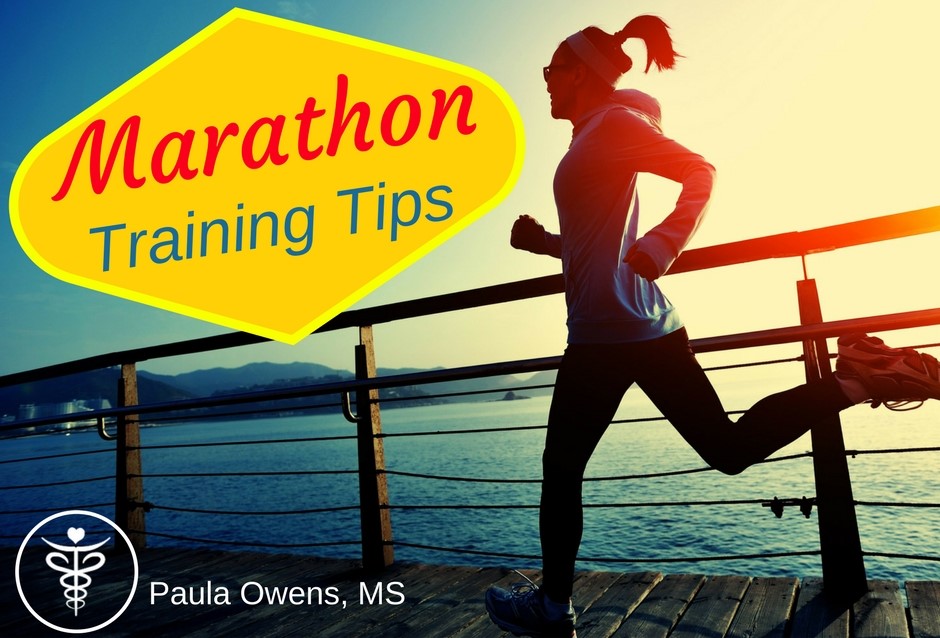Educating and Empowering You to Heal, Thrive, and Live a Happy, Healthy Lifestyle
Marathon Training Tips: Perform Your Best & Stay Injury-Free
 Are you considering running a marathon? Many people are inspired to challenge themselves and attain the goal of completing a marathon. Running a marathon is an activity that requires preparation, a well-designed marathon training program, dedication, nutrition, injury prevention, and sufficient rest and recovery.
Are you considering running a marathon? Many people are inspired to challenge themselves and attain the goal of completing a marathon. Running a marathon is an activity that requires preparation, a well-designed marathon training program, dedication, nutrition, injury prevention, and sufficient rest and recovery.
Marathon Training: Most Common Injuries & Muscular Imbalances
Due to the high volume of training and repetitive movement that’s required for marathon training, come injuries. The most common injuries marathon runners tend to deal with are shin splints, stress fractures, muscle strains, patellofemoral pain syndrome that causes pain under and around the knee, and ITB Syndrome (iliotibial band), which causes pain on the outside of the knee, outer thigh and hip. How to Heal Injuries Faster
Due to the forward running motion, various muscle groups tend to overdevelop creating postural deviations, foreward head posture, overuse syndromes, and imbalances. The calf muscles develop more than the anterior shin muscles, the quadricep muscles develop more than the hamstrings and glute muscles, short and tight chest muscles in conjunction with long, weak upper and middle back muscles, the neck flexors tighten, and the lower back muscles tend to shorten and overdevelop compared to the abdominal muscles.
“These injuries often result from over-training or increasing mileage too quickly. It’s important to schedule rest days and build up slowly.” –Haemi Choi, MD, a sports medicine specialist at Loyola
Marathon Training Tips
Perform your best and avoid injuries
Hydration. The International Marathon Medical Directors Association recommends that runners drink only when thirsty. Dehydration leads to low back pain, joint pain, electrolyte imbalances, and decreased performance. On the other hand, drinking too much fluid while running can be just as problematic. Drinking too much during exercise can dilute the sodium content of blood to abnormally low levels.
Healthy DIY Chemical-free Electrolyte Beverage Recipe

-
48 ounces filtered or spring water
-
1-2 tsp. unprocessed Celtic sea salt (helps your body absorb water and provides additional minerals that are lost through sweating)
-
2 scoops Amino Complex
-
4-6 ounces organic tart Cherry Juice
Drinking tart cherry juice for 7 days before and during a strenuous running event minimizes post-run muscle pain. — Journal of the International Society of Sports Nutrition
The powerful antioxidant compounds in tart cherry juice help decrease oxidative damage that normally occurs during marathon training and when muscles are worked to their max, thereby allowing muscles to recover more quickly. —Medicine & Science in Sports & Exercise
Nutrition. Women particularly overlook the importance of their diet when it comes to the rigorous training that running a marathon requires. When the volume of training increases, so do energy requirements. Eating a variety of nutrient-dense foods at every meal is required to support your marathon training needs and prevent marathon training injuries.
Marathon training and endurance athletes perform better when their fat intake is at least 30% of total caloric intake.
Due to the vast amount of stress placed upon the body with marathon training, protein requirements increase as well. Without adequate protein, your muscles will not be able to go the distance, recover sufficiently or repair afterwards.
Marathon Training Health Hazards
Excessive long slow duration, cardio-aerobic style exercise increases oxidative stress, accelerates aging and damages the heart.
Years of strenuous exercise, marathon training, completing marathon or ultra-marathon races is associated with an increased risk of heart damage. – Journal of Applied Physiology
Certain types of prolonged exercise in endurance athletes cause heart damage including scarring and structural changes, diminished function of the right ventricle of the heart after endurance racing, and increased blood levels of cardiac enzymes, which are markers for heart injury.
Marathon training increases oxidative stress, accelerates aging, damages mitochondria, increases cortisol, compromises immune function, and creates excess inflammation!
A study in the Journal of Sports Medicine and Physical Fitness found that marathon runners had higher inflammatory markers at rest than control groups and sprinters.
Although exercise has numerous health benefits, few people realize that when done to extremes, such as marathon training it also causes metabolic damage and increases cardiac risk. There is an increase in whole body oxygen consumption with marathon training that produces reactive oxygen species (ROS), which can be harmful at rates that exceed the body’s natural capacity to detoxify them.
Oxidation is a process that forms free radical damage. Normally the body can neutralize free radicals with antioxidants, however when there’s an excessive build-up of free radicals from heavy, intense marathon training the body cannot neutralize all of the free radicals.
Shoes. Invest in new shoes every 300 miles. Avoid wearing new shoes on race day. If necessary, they should be replaced 3-4 weeks prior to the marathon to ensure your feet adjust to the new fit.
Cross train and periodize your training program. Hire a qualified strength coach to design a program specific to you. A smart marathon training program is one that’s periodized and planned out interspersing volume and intensity. Marathon runners and triathletes can increase their VO2 max close to 4% and raise the lactate threshold over 8% when they add one to two days of interval training and a well-designed strength training program to their training regime. The study used 6-8 thirty-second all out sprints on a stationary bike followed by 3.5 minute rest.
Stretching, Yin Yoga, Restorative Yoga and Myofascial Release. Dynamic warm up before training is essential in preparing your body for optimal performance and the demands placed upon it. Static stretching is best saved for post-training to promote tissue length and elasticity, and activate the parasympathetic nervous system.
Self-Myofascial Release (SMR) using a foam roller helps with injury prevention, flexibility and muscle recovery. SMR is an extremely effective rehab technique for ITB syndrome. Daily use helps to increase flexibility and breakdown adhesions in muscle and fascia. Myo = muscle and fascia = fibrous connective tissue encasing the muscles. For an small investment, (usually under $20) a foam roller is a must for all marathon trainees.
Nutritional supplementation can encourage better performance, promote recovery, reduce inflammation, and lessen oxidative stress. Just a few items to consider: branched-chain amino acids, CoQ10, proteolytic enzymes, omega-3s, vitamin D, probiotics, L-glutamine powder, and magnesium.
Sleep, Rest and Recovery. Restore energy and increase recovery from intense training. Don’t underestimate recovery and rest days. Listen to your body and rest especially if you feel sluggish or tired, have aches and pains, experience sudden weight loss of 5 or more pounds, are excessively thirsty, your resting heart rate is 5 BPM higher, or you feel a sore throat or cough coming on.
Due to the vast amount of stress marathon and long distance runners place upon their bodies, they often suffer with respiratory ailments, colds and a compromised immune function.
Treat yourself to a massage or some other form of bodywork. Cold-water immersion to reduce inflammation, promote recovery and aid injuries. Soak in an Epsom salt bath. Your body will absorb the magnesium from the Epsom salts aiding in muscle relaxation. Schedule an appointment with your chiropractor to maintain proper spinal alignment and optimal nerve function.
Related Posts
- Healthy Homemade Electrolyte Drink Recipe
- Foam Roller Exercises
- How to Heal Injuries Faster
- Video: Dramatic Healing Tool

